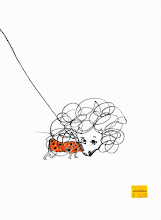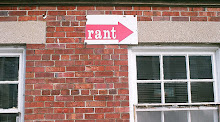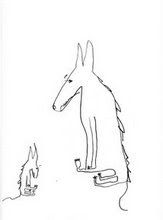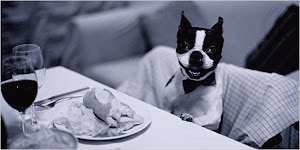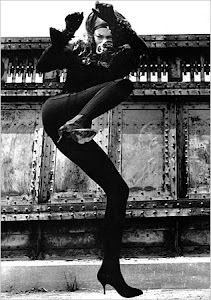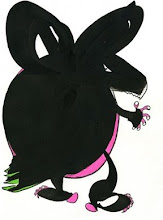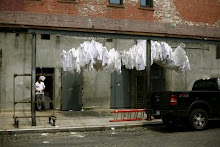I have a theory about professions and those who know me should skip to another paragraph because they have heard this all too often. A profession is a language and only those within it know what the language is, and this ensures that the rest of us must pay fees (sometimes exhorbitant) to avail ourselves of those who know it. A professional will tell you that the definition of "profession" is "self-regulating". Eg., Law is a profession because there are law societies that get mad at people who are lawyers and who behave badly and so on and so on. Nice for them to say. The reality is, and trust me, the language thing.
So, when you recieve a lawyer's letter telling you that you must pay your ex-spouse another gazillion, you yourself could write back "piss up a rope" but that would be wrong and not the right language. Instead you must hire a lawyer who will talk to you about why your spouse has a point (an hour or two at a rate of hundreds per) and then will write a letter back saying "piss up a rope my learned friend" or thereabouts for another few hundred and you will be no further ahead and that many lawyer's fees behind.
Such is the nature of a profession.
A profession I have to deal with daily comes by many names but let's just call it technology for short. This is a vast black box in many a corporation and it is those in technology alone who will say yay or nay or yay by how much money to any idea, strategy, innovation or thought you may have. None of us not conversant in the layers of meaning of Lord of the Rings AND Star Trek AND South Park AND whatever game has just been released have ANY idea of what is the what so we can't truly argue. We lie back and hope they'll do something for us and not to us, and hope further for the best. It is easy to feel the dark of the black box. When I last built a major e-comm website, for example, we had a concept for how best to present our merchandise and showed the tech team the idea in a photoshop sort of document, as per how we might present a magazine page. Oh no simply cannot be done my god are you crazy the internet cannot do such things no no no we were told and I am not joking later that same DAY we saw a live version of same, created by some rebel on the tech team.
So.
I am working now on a major redesign of another major website and so I am hoping to head such events off at the pass (or the past) by knowing MORE THAN IS EXPECTED about the applications we are using.
All travel, perhaps especially intellectual, starts at the bookstore.
So I went to my local big box wonderful rich bookstore and looked for books that would tell me what I needed to know about the platform I would be using and the applications and flexibility I could count on.
I bought Essential .net 2.0 because the intro was nicely written and I could sort of get the gist. I bought the Dummies book because I realize that while I use terms like "applications" like crazy, I am not sure I could win a round of Reach for the Top if asked to express the exact definition.
The sum of this reading is I want to tell you about not the books that are written, but the ones that should be.
I understand one word in ten of Essential ASP.NET 2.0 and there are pages and pages devoted to code which is entirely revealing I'm sure to those already in the club. I love that coders, those remote folk who don't seem to communicate with the rest of us, use such sweet terms as "children" to refer to what I might (though I may be wrong) call sub-pages. This from those who also use names like "Mozilla" to describe a browser. A browser to me is someone wandering around a store waiting to be inspired ("no thanks, I'm just a browser") whereas "Mozilla" is close to "monster" ("leave me alone, I'm a monster"). A very different feeling is conjured. This may not be the essential point this book is making.
Building a Website for Dummies is, sadly, way too dumb.
So all this preamble leads me to this simple point: if there are courses you can take on "finance for non-financial executives" and such, why can't I find a book that tells me what I might want to know as NOT A TECH GEEK about .net? What my business can now accomplish, what great customer service I can provide, what wonderful contextual content I can give you, a visitor to my site, so that you find what you need to know without having to search too hard? Where is "technology for non-tech executives"?
I think this is a big gap in the market.
So I am not describing here what you can read but what you cannot. Sorry.
Wednesday, May 30, 2007
Saturday, May 26, 2007
The Age of Innocence - more
I must have read this book a half dozen times now, and I've seen the movie about as many. The movie is worth it, too, not just for extended views of Daniel Day Lewis but have you ever seen a glove, a demure one, not as per Dita von Teese and her ilk, handled so sensually and erotically? In those early days of manners and layers and layers of dressing you take your sensual pleasures where you can.
If we focus strictly on relationships and not the larger views of art, culture and social mores, this book is cautionary and richly detailed. Edith Wharton tips her hand in terms of where her views are on the worth of the individual versus the group in that the warm, alluring, clever, imaginative Countess Olenska is a far more captivating character than the conventional, dreary (but sweet! oh so sweet) May.
Newland Archer thinks he is a good man but like many who take this as a virtue, he is merely a weak man who follows where he is led. He has a passionate flirtation with Olenska but balks at the social cost of being in a relationship with someone so original. She has his heart and soul, but something else -- what IS it, this thing inside so many people that causes them to compromise living their true lives?? -- moves him toward May.
And then May outplays him. Plays the oldest trick in the book. While he can faithfully explain his unfaithfulness to her -- he had to marry her, it was expected, but he doesn't LOVE her you see, he loves you Olenska!! May gets pregnant.
So what we know of Archer is that he is deeply, deeply unworthy. Olenska removes herself from the fray and at first you can think poor dear, he betrayed her and she is sad and sorry. But she isn't I don't think. He has played both sides and she now finds him tedious. And forces him to accept the choice he has clearly made. No more cake eating for Archer.
In the end Archer has May and a family and Olenska retains her intriguing life and her circle of interesting, artistic friends and, in the end, the interest of one of Archer's children.
But who has won?
Neither. There is no winning of course -- Archer has a family and the love of children and conventional success and social position. Olenska, and I relate to her I blush to admit, I hope I am not overestimating how deeply interesting I am (though in fairness Wharton has ensured we ALL prefer Olenska) Miss Olenska has her circle of witty and intellectual friends who we know for sure are fascinated by her and adore her from afar. It is not fully spelled out but it seems she has never had that great soul-touching love. Perhaps it is impossible to love someone so glittering and glorious, as she is extraordinary enough to elicit fear (that you might not measure up, that if she left YOU the hollow absence would obliterate you). Both Archer and Olenska remain admired but unseen and unknown to their last day. Perhaps the point is their only chance at being truly known, and loved, was with each other. And Archer choked.
It's good that he recognized he choked. In the end his son asks if he will come into the salon to see Olenska again. He has the good grace to stay away.
If we focus strictly on relationships and not the larger views of art, culture and social mores, this book is cautionary and richly detailed. Edith Wharton tips her hand in terms of where her views are on the worth of the individual versus the group in that the warm, alluring, clever, imaginative Countess Olenska is a far more captivating character than the conventional, dreary (but sweet! oh so sweet) May.
Newland Archer thinks he is a good man but like many who take this as a virtue, he is merely a weak man who follows where he is led. He has a passionate flirtation with Olenska but balks at the social cost of being in a relationship with someone so original. She has his heart and soul, but something else -- what IS it, this thing inside so many people that causes them to compromise living their true lives?? -- moves him toward May.
And then May outplays him. Plays the oldest trick in the book. While he can faithfully explain his unfaithfulness to her -- he had to marry her, it was expected, but he doesn't LOVE her you see, he loves you Olenska!! May gets pregnant.
So what we know of Archer is that he is deeply, deeply unworthy. Olenska removes herself from the fray and at first you can think poor dear, he betrayed her and she is sad and sorry. But she isn't I don't think. He has played both sides and she now finds him tedious. And forces him to accept the choice he has clearly made. No more cake eating for Archer.
In the end Archer has May and a family and Olenska retains her intriguing life and her circle of interesting, artistic friends and, in the end, the interest of one of Archer's children.
But who has won?
Neither. There is no winning of course -- Archer has a family and the love of children and conventional success and social position. Olenska, and I relate to her I blush to admit, I hope I am not overestimating how deeply interesting I am (though in fairness Wharton has ensured we ALL prefer Olenska) Miss Olenska has her circle of witty and intellectual friends who we know for sure are fascinated by her and adore her from afar. It is not fully spelled out but it seems she has never had that great soul-touching love. Perhaps it is impossible to love someone so glittering and glorious, as she is extraordinary enough to elicit fear (that you might not measure up, that if she left YOU the hollow absence would obliterate you). Both Archer and Olenska remain admired but unseen and unknown to their last day. Perhaps the point is their only chance at being truly known, and loved, was with each other. And Archer choked.
It's good that he recognized he choked. In the end his son asks if he will come into the salon to see Olenska again. He has the good grace to stay away.
Tuesday, May 22, 2007
Returning to the Age of Innocence
When distracted by distraction and unable to sink properly into a book it sometimes helps to revisit past loves. One of these is The Age of Innocence by Edith Wharton.
There are few writers as truly modern or perceptive as Wharton, who depicts a grasping, aspiring, acquiring culture that should be long dead but alas is thriving, in much the same form as it was in her day. People will say Wharton writes of society and its manners and mannerisms, and I find her acute eye for what goes on among women, and women and men, particularly instructive. She missed nothing, and not much has changed.
The Age of Innocence speaks particularly loudly to me. Newland Archer loves Countess Olenska, said to be disgraced in the eyes of her peers. Olenska is not disgraceful in the least -- she is strong, smart, real and since those around her are merely strong and smart, she loses. She is far too dangerous, far too rich a brew or too adventurous a choice for the sad Archer to make and he instead is swept into the seemingly gentle May's seemingly gentle embrace.
But May is far more devious than Olenska, and plays her cards well. She is not thought to be anything but sweet and slightly stupid and so hides in plain sight, she is the reasonable and expected choice and lives the life she wants without hesitation or obstacle. Archer and Olenska not so much.
Would that Archer were stronger, or not so concerned about "ought".
I read this book years ago when I played the Olenska role in another life, the whore to another woman's virgin. I lost then, too, but lost only the man. Like Olenska, I retained the life of a seeker, a thinker, a real person which perhaps is better in the end....fewer babies, yes, but fewer regrets as well.
Perhaps I am mistaken about that. In a world made up of virgins and whores, the virgins seem to do pretty well. They are satisfied with less. They understand the weakness that brought them their victory and they're fine with it, they don't care that much about truth and beauty anyway. Just comfort and the joy of knowing you have a place and you're always in it.
Lucky ducks.
There are few writers as truly modern or perceptive as Wharton, who depicts a grasping, aspiring, acquiring culture that should be long dead but alas is thriving, in much the same form as it was in her day. People will say Wharton writes of society and its manners and mannerisms, and I find her acute eye for what goes on among women, and women and men, particularly instructive. She missed nothing, and not much has changed.
The Age of Innocence speaks particularly loudly to me. Newland Archer loves Countess Olenska, said to be disgraced in the eyes of her peers. Olenska is not disgraceful in the least -- she is strong, smart, real and since those around her are merely strong and smart, she loses. She is far too dangerous, far too rich a brew or too adventurous a choice for the sad Archer to make and he instead is swept into the seemingly gentle May's seemingly gentle embrace.
But May is far more devious than Olenska, and plays her cards well. She is not thought to be anything but sweet and slightly stupid and so hides in plain sight, she is the reasonable and expected choice and lives the life she wants without hesitation or obstacle. Archer and Olenska not so much.
Would that Archer were stronger, or not so concerned about "ought".
I read this book years ago when I played the Olenska role in another life, the whore to another woman's virgin. I lost then, too, but lost only the man. Like Olenska, I retained the life of a seeker, a thinker, a real person which perhaps is better in the end....fewer babies, yes, but fewer regrets as well.
Perhaps I am mistaken about that. In a world made up of virgins and whores, the virgins seem to do pretty well. They are satisfied with less. They understand the weakness that brought them their victory and they're fine with it, they don't care that much about truth and beauty anyway. Just comfort and the joy of knowing you have a place and you're always in it.
Lucky ducks.
Saturday, May 19, 2007
Reading and distracted from distraction by distraction
Quick question: How distracted to you have to be in order to be unable to focus on even a murder mystery?
Answer: Pretty damn distracted.
Murder mysteries are literary junk food, the go-to when under stress and pressure when something more shall we say challenging, like a proper novel, is way beyond the brain cells. But, here's the thing -- my eyes run over the pages and I turn them at intervals but I have no idea what I'm reading.
I'm currently wading through The Lighthouse, NOT by Woolf who wrote something about a lighthouse but PD James. You can't get more of a warm bath of a book than a PD James can you? And yet here I am on page 75 and I have no idea whatsovever as to who is dead or why I care or who is talking just now. Maybe the murder hasn't happened yet. No, can't be that, the police and Dalgliesh are in attendance. Ok, so, the choice is to start over or give it up.
I had similar issues with the apparently very good Hakan Nesser. He is part of a trend among publishers to find hugely popular mystery authors from countries that don't publish in English, buy up the rights and issue to us. A trend started by the "discovery" of Henning Mankell, also a million best seller in his native land who is a newby here.
I don't know much about the Nesser book but I CAN tell you that his author photo shows a very handsome man who lives in Sweden and New York. No mention of "Lives with his wife and two daughters" so this is good news....have I mentioned he's very handsome? I wonder which bars he goes to in New York, and I wonder how tall he is maybe I can google him or perhaps would he possibly by some fluke be on facebook let me check that out...
See? It goes nowhere, I finished the book and again, I can't tell you who is dead but the mystery of Borkmann's Point is solved no later than the last page and as I recall some of the sentences (not of the jail kind) were very good. I do remember that.
OK so this is becoming a desperate situation, I really love to read. So, I've tried magazines, the default of defaults and generally speaking I read them, well, Vogue anyway, as a book, starting at the first page and reading every word because if Anna Wintour thought the story is important, it is. Alas I've found myself turning pages without absorbing much except that Kate Moss can look a little hippy in straight leg jeans and flats, how interesting even a supermodel can look like she has a big back yard how interesting hmmm best never try that look myself remember to always wear heels yup good idea.
See? I've gone pathetic.
Answer: Pretty damn distracted.
Murder mysteries are literary junk food, the go-to when under stress and pressure when something more shall we say challenging, like a proper novel, is way beyond the brain cells. But, here's the thing -- my eyes run over the pages and I turn them at intervals but I have no idea what I'm reading.
I'm currently wading through The Lighthouse, NOT by Woolf who wrote something about a lighthouse but PD James. You can't get more of a warm bath of a book than a PD James can you? And yet here I am on page 75 and I have no idea whatsovever as to who is dead or why I care or who is talking just now. Maybe the murder hasn't happened yet. No, can't be that, the police and Dalgliesh are in attendance. Ok, so, the choice is to start over or give it up.
I had similar issues with the apparently very good Hakan Nesser. He is part of a trend among publishers to find hugely popular mystery authors from countries that don't publish in English, buy up the rights and issue to us. A trend started by the "discovery" of Henning Mankell, also a million best seller in his native land who is a newby here.
I don't know much about the Nesser book but I CAN tell you that his author photo shows a very handsome man who lives in Sweden and New York. No mention of "Lives with his wife and two daughters" so this is good news....have I mentioned he's very handsome? I wonder which bars he goes to in New York, and I wonder how tall he is maybe I can google him or perhaps would he possibly by some fluke be on facebook let me check that out...
See? It goes nowhere, I finished the book and again, I can't tell you who is dead but the mystery of Borkmann's Point is solved no later than the last page and as I recall some of the sentences (not of the jail kind) were very good. I do remember that.
OK so this is becoming a desperate situation, I really love to read. So, I've tried magazines, the default of defaults and generally speaking I read them, well, Vogue anyway, as a book, starting at the first page and reading every word because if Anna Wintour thought the story is important, it is. Alas I've found myself turning pages without absorbing much except that Kate Moss can look a little hippy in straight leg jeans and flats, how interesting even a supermodel can look like she has a big back yard how interesting hmmm best never try that look myself remember to always wear heels yup good idea.
See? I've gone pathetic.
Saturday, May 12, 2007
That Extra Half an Inch - Victoria Beckham
Posh is one of those rare women (but they are always women) who gets to stand for everything bad in the world. Take her out and you solve a number of issues at once -- England would have won (something or other) and Spain would win (something or other) the universe would be less shallow and women everywhere would get a free kick at her glorious husband. She is a lightning rod for criticism and controversy, the woman can't wear a pair of jeans without being called names, and can't try to do something useful with her life without being called a dilettante. Like there aren't LOTS of women who have married their way to owning a bikini store.
Poor rich Posh.
I've just read that extra half an inch (the lack of caps is for accuracy, none appear on the shiny pretty book cover) and what we have here is the world's best girlfriend. Vic is a girly girl in a household full of boys and she is utterly oblivious and unrepentent about it. Her book is about style and living the girly life, dressing up, feeling good about yourself (for knowing about lipgloss not for saving the bloody world and let's face it, the former is easier to achieve than the latter so why set yourself up for failure) . It is fun and frothy, and what becomes clear is that Victoria is really nice and exactly the right person to take with you shopping, exactly who you would want in the seat next to you on the plane. This is no small matter -- taking anyone shopping with you is fraught with peril, as in, do these pants actually look good or is she gloating quietly that I really do look fat in that; trapped on an airplane with boringboy is a pain worse than turbulance.
For the new love of Posh I've also checked out her official website and blog and it is equally charming and delightful, equally sparkly and cute. But it is also more than that -- Posh is funny, disarming, self-deprecating in an amusing and not nutty way (welcome to LA Posh). Check her out, she's terrific: www.dvbstyle.com.
And you know what? Those jeans with the crowns on the bum are great. I don't care what you say.
Poor rich Posh.
I've just read that extra half an inch (the lack of caps is for accuracy, none appear on the shiny pretty book cover) and what we have here is the world's best girlfriend. Vic is a girly girl in a household full of boys and she is utterly oblivious and unrepentent about it. Her book is about style and living the girly life, dressing up, feeling good about yourself (for knowing about lipgloss not for saving the bloody world and let's face it, the former is easier to achieve than the latter so why set yourself up for failure) . It is fun and frothy, and what becomes clear is that Victoria is really nice and exactly the right person to take with you shopping, exactly who you would want in the seat next to you on the plane. This is no small matter -- taking anyone shopping with you is fraught with peril, as in, do these pants actually look good or is she gloating quietly that I really do look fat in that; trapped on an airplane with boringboy is a pain worse than turbulance.
For the new love of Posh I've also checked out her official website and blog and it is equally charming and delightful, equally sparkly and cute. But it is also more than that -- Posh is funny, disarming, self-deprecating in an amusing and not nutty way (welcome to LA Posh). Check her out, she's terrific: www.dvbstyle.com.
And you know what? Those jeans with the crowns on the bum are great. I don't care what you say.
Thursday, May 10, 2007
Eat Pray Love - the final analysis
Eat Pray Love would seem a perfect book for me right now, truly. And yet, I found the chipper tone and cutesy jokey manner way too, well, chipper and cutesy -- I am not so sufficiently past the things that ail me, those same things that were ailing the author, to be able to laugh along with her. That said, the book has had echoes I didn't expect.
Author Liz Gilbert embarked on a journey of the heart and soul to try to reclaim herself (or perhaps to actually find herself in the first place) after a difficult divorce and a heartbreak over another seemingly perfect man. I am heartbroken that a seemingly perfect man has decided against Uz, or the Uz we knew anyway, and so the journey Liz took was of special interest. Rarely does a book and the therapy it is supposed to do match so perfectly.
Liz and I would likely not be friends -- her determined optimism gets on my nerves. As well, I cannot imagine wanting to meditate in a place where drinks are decidedly NOT served, and am bored senseless with the idea of chanting and getting spiritual-- the heart of the book and her life. This is more my flaw than hers, I readily admit it. She is both lighter and deeper than I am, and both ends of that spectrum took me out of the book's flow.
However, Liz did offer wisdom and her book has stayed with me in ways I didn't expect. She took months off to meditate in an ashram, a real one, the kind you find in India, and she clearly broke through to the very soul of herself. She found the core of the universe. But she also found one truth that resonated deeply and may resonate with anyone who inexplicably cannot see the forest for the trees with men, and who attaches herself to what they colloquially call "bad boys" or at least men bad for her. Because such a thing as hitching yourself to someone bad for you does not actually make sense, there has to be a neurotic reason for it.
What Liz discovered is that she loved most not the man she was with but who he could be-- she loved her vision of him, in other words. This is perilously close to a narcissist who loves only an image. But if I were to be painfully honest I would have to say that I loved who I knew he could be, who he was on the way to becoming....not so much who he reverted to and who he IS, in fact, right this minute. People don't change, anyone will tell you that, but it isn't actually true. People sometimes don't STAY changed, that's the thing.
That I loved someone who no longer exists is not truly a consolation -- it's a death, really, and I grieve it deeply. It is frustrating that he COULD have existed. But that is a selfish thing for me to wish, of course.
Still, for this small piece of insight and small peace of mind, the book was well worth the experience.
Author Liz Gilbert embarked on a journey of the heart and soul to try to reclaim herself (or perhaps to actually find herself in the first place) after a difficult divorce and a heartbreak over another seemingly perfect man. I am heartbroken that a seemingly perfect man has decided against Uz, or the Uz we knew anyway, and so the journey Liz took was of special interest. Rarely does a book and the therapy it is supposed to do match so perfectly.
Liz and I would likely not be friends -- her determined optimism gets on my nerves. As well, I cannot imagine wanting to meditate in a place where drinks are decidedly NOT served, and am bored senseless with the idea of chanting and getting spiritual-- the heart of the book and her life. This is more my flaw than hers, I readily admit it. She is both lighter and deeper than I am, and both ends of that spectrum took me out of the book's flow.
However, Liz did offer wisdom and her book has stayed with me in ways I didn't expect. She took months off to meditate in an ashram, a real one, the kind you find in India, and she clearly broke through to the very soul of herself. She found the core of the universe. But she also found one truth that resonated deeply and may resonate with anyone who inexplicably cannot see the forest for the trees with men, and who attaches herself to what they colloquially call "bad boys" or at least men bad for her. Because such a thing as hitching yourself to someone bad for you does not actually make sense, there has to be a neurotic reason for it.
What Liz discovered is that she loved most not the man she was with but who he could be-- she loved her vision of him, in other words. This is perilously close to a narcissist who loves only an image. But if I were to be painfully honest I would have to say that I loved who I knew he could be, who he was on the way to becoming....not so much who he reverted to and who he IS, in fact, right this minute. People don't change, anyone will tell you that, but it isn't actually true. People sometimes don't STAY changed, that's the thing.
That I loved someone who no longer exists is not truly a consolation -- it's a death, really, and I grieve it deeply. It is frustrating that he COULD have existed. But that is a selfish thing for me to wish, of course.
Still, for this small piece of insight and small peace of mind, the book was well worth the experience.
Subscribe to:
Posts (Atom)
